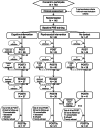Five-year effects of cognitive training in individuals with mild cognitive impairment
- PMID: 39246830
- PMCID: PMC11378074
- DOI: 10.1002/dad2.12626
Five-year effects of cognitive training in individuals with mild cognitive impairment
Abstract
Introduction: In a 5-year follow-up study, we investigated the enduring effects of cognitive training on older adults with mild cognitive impairment (MCI).
Methods: A randomized controlled single-blind trial involved 145 older adults with MCI, assigned to cognitive training (MEMO+), an active control psychosocial intervention, or a no-contact condition. Five-year effects were measured on immediate and delayed memory recall, the Montreal Cognitive Assessment screening test (MoCA), self-reported strategy use, and daily living difficulties.
Results: At follow-up, participants who received cognitive training showed a smaller decline in delayed memory and maintained MoCA scores, contrasting with greater declines in the control groups. Cognitive training participants outperformed controls in both delayed memory and MoCA scores at the 5-year time point. No significant group differences were observed in self-reported strategy use or difficulties in daily living.
Discussion: Cognitive training provides long-term benefits by mitigating memory decline and slowing clinical symptom progression in older adults with MCI.
Highlights: Cognitive training reduced the 5-year memory decline of persons with MCI.Cognitive training also reduced decline on the Montreal Cognitive Assessment (MoCA).No intervention effect was found on strategy use or activities of daily living.
Keywords: cognition; cognitive training; long‐term benefit; mild cognitive impairment; psychosocial intervention.
© 2024 The Author(s). Alzheimer's & Dementia: Diagnosis, Assessment & Disease Monitoring published by Wiley Periodicals LLC on behalf of Alzheimer's Association.
Conflict of interest statement
Sylvie Belleville has been a consultant for research development on the prevention of Alzheimer's disease for the Fondation IUGM (2016) and for Lucilab (2017 to current). She has also been involved in developing a cognitive stimulation program for the Centre de promotion de la Santé Avant Âge (2015). Sylvie Belleville holds intellectual property rights for the “Programme de Stimulation pour une santé cognitive, Memoria, Batterie d’évaluation de la mémoire Côte‐des‐Neiges” and “MÉMO, Méthode d'Entrainement pour une Mémoire Optimale.” Carol Hudon has worked as a rater in clinical trials (Lundbeck, Roche), and as a consultant for Bracket Global. Sébastien Grenier has intellectual property rights for the “Programme d'intervention psychosociale axé sur le bien être psychologique.” Brigitte Gilbert served as a consultant for the development the “Ateliers de stimulation pour une santé cognitive” (2014). She also holds intellectual property rights for “MÉMO: Méthode d'entrainement pour une mémoire optimale” (2007). Marie‐Christine Ouellet holds intellectual property rights for the “Programme d'intervention psychosociale axé sur le bien être psychologique.” Chantal Viscogliosi is responsible for the training on assessment and intervention for older adults with cognitive impairment at the Ordre des Ergothérapeutes du Québec. She conducts training for multidisciplinary teams in cognitive strategies with older adults with cognitive disorders. Serge Gauthier is member of Scientific Advisory Boards with Alzheon, AmyriAD, Eisai Canada, EnigmaUSA, Lilly Canada, Medesis, Roche Canada, TauRx. Lectures for Biogen Canada, Lundbeck Korea. Nathalie Bier is responsible for training on occupational therapy assessment and interventions for adults and older adults with cognitive impairment at the Université de Montréal's continuing education training program. She is a founding member of a solidarity cooperative that sells technologies to support older adults aging in place. The other authors, Marc Cuesta and Catherine Brodeur, have no conflict of interest to disclose. Author disclosures are available in the Supporting Information.
Figures


References
LinkOut - more resources
Full Text Sources
